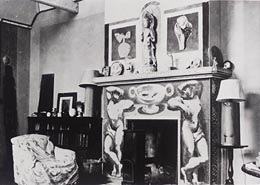|
Growing up |
Marriage, friends and lovers |
Charleston farmhouse |
Sadness in later years
Charleston farmhouse

| It's most lovely, very solid and simple. |

Letter from Vanessa Bell to Roger Fry, 1916 |
This is how Vanessa described her new home in a letter to Roger Fry.
She moved to Charleston near Firle in Sussex in October 1916, with her two children, Duncan Grant and his current lover
David 'Bunny' Garnett, a nurse, a housemaid, a cook, and Duncan's dog Henry.
The owner of the empty farmhouse was looking for farm hands as well as tenants, providing Grant and Garnett with not only a home, but also the opportunity of work
on the land and therefore exemption from military service during the First World War.
|
 |

Charleston Farmhouse
© Tate Archive, 2003 |
Letter from Vanessa Bell to Roger Fry, 1916 in which she describes Charleston
© Henrietta Garnett. All rights reserved |


Charleston interiors
© Tate Archive, 2003

Family and friends of Vanessa Bell at Charleston
© Tate Archive, 2003 |
The house was thought to date from the eighteenth century but it was later discovered that it had been grafted on to a half-timbered late Elizabethan building.
Although an impressive property, the house was somewhat dilapidated, the garden was overgrown and inside there was no telephone, central heating or electricity.
Its setting however was magnificent, sited on a gentle slope in beautiful downland scenery overlooking the Weald.
Duncan and Vanessa chose rooms for their studios and immediately started to decorate the house.
Walls, fireplaces, door panels and furniture were all decorated to harmonise with their paintings and Omega
fabrics and ceramics were incorporated into the overall décor.
Vanessa kept the house on after the war as a summer residence, and gradually improvements and extra comforts were added.
House parties were common and Charleston was frequently full of guests. Clive Bell came to visit his sons, and the
Woolfs lived only four miles away.
Other guests included Roger Fry and his children, Maynard Keynes
and his wife the dancer Lydia Lopokova and Lytton Strachey and his sisters.
All were captured by Vanessa with her camera, and some with her paintbrushes.
In December 1916, Dora Carrington was invited to stay at Charleston, and provided a lively account of the experience in a letter to her friend Christine Nash.
Vanessa had always hoped to run a Summer School for children which would arouse their interest in the arts without the stifling orthodoxy of a traditional school.
In 1925 and 1926 she achieved this when Marjorie Strachey ran courses for about ten children at Charleston.
She ran a full curriculum for them including drama productions which were presented to their parents and friends.
Amateur dramatics continued to be a popular form of entertainment at Charleston in the period between the wars.
Charleston became a full-time home again during the Second World War as it was safely out of reach of the bombs falling on London, and Vanessa continued to live there
for part of each year until her death in 1961.
Duncan kept the house on for a few years longer but it was too large for him and he eventually moved out.
The house is now maintained by The Charleston Trust who have renovated and opened it to the public. |
|
